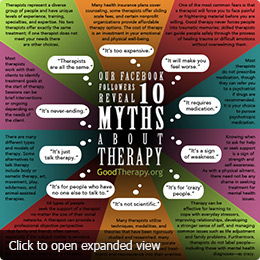Myths About Therapy
Mental health challenges affect millions of people around the world. Unfortunately, misconceptions about therapy often discourage people from seeking help. They also contribute to the stigma surrounding mental health issues, and prevent people from learning more about or utilizing the services of trained mental health professionals.
GoodTherapy aims to provide accurate, helpful information about therapy and mental health care to combat any reservations people may have about getting help or finding a therapist. Here you can explore common myths in therapy to dispel any fears or misconceptions and better understand the potential benefits of counseling and therapy. Our hope is that someday misinformation, fears, and stigma will no longer be a barrier for people who would like the support of a counselor or therapist.
Common Myths in Therapy
In a unique series of articles, Noah Rubinstein, licensed marriage and family therapist and founder of GoodTherapy, unpacks some of the most common myths and fears in therapy:
 How is it that psychotherapy has the power to change lives in extraordinary ways, yet the vast majority of people who can afford to go simply don't?
How is it that psychotherapy has the power to change lives in extraordinary ways, yet the vast majority of people who can afford to go simply don't?
It's natural and normal to fear what we don't fully understand, and fear, it seems, is at the heart of the question—but it's only part of the answer. This has become apparent to me over 20 years working as a counselor and psychotherapist in community health centers, residential treatment, hospice, school systems, and in my own private practice. My experience has brought to light some common reasons people dismiss or avoid therapy, most of which are perpetuated by a host of myths and misinformation. These myths, of course, contribute to the destructive forces of stigma, forces we strive every day to combat at GoodTherapy.
If you've discounted therapy for any reason, I highly encourage you to explore the following myths to see if any have kept you from becoming the person you want to be. If you're a therapist, I hope you'll consider what you can do in your interactions with people to help counter the fears these myths foster.










 The Myths of Therapy
The Myths of Therapy
 Four Unexpected Benefits of Therapy
Four Unexpected Benefits of Therapy
 Five Lies People Learn from the Media About Therapy
Five Lies People Learn from the Media About Therapy
 Therapy Is Not a Place for Romance
Therapy Is Not a Place for Romance
 50 Signs of Good Therapy
50 Signs of Good Therapy
 Mayhem, Misunderstandings, and Mental Health
Mayhem, Misunderstandings, and Mental Health